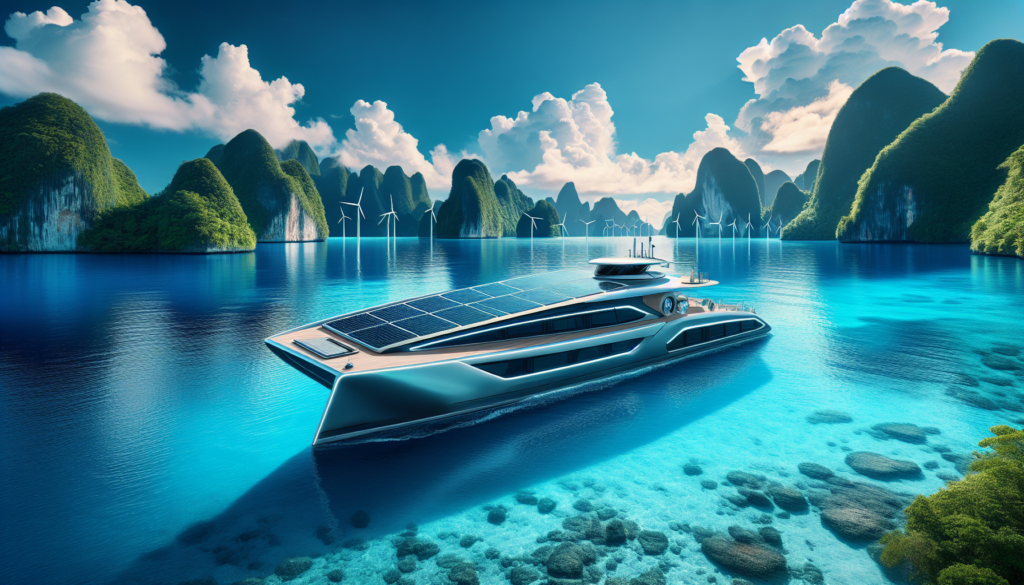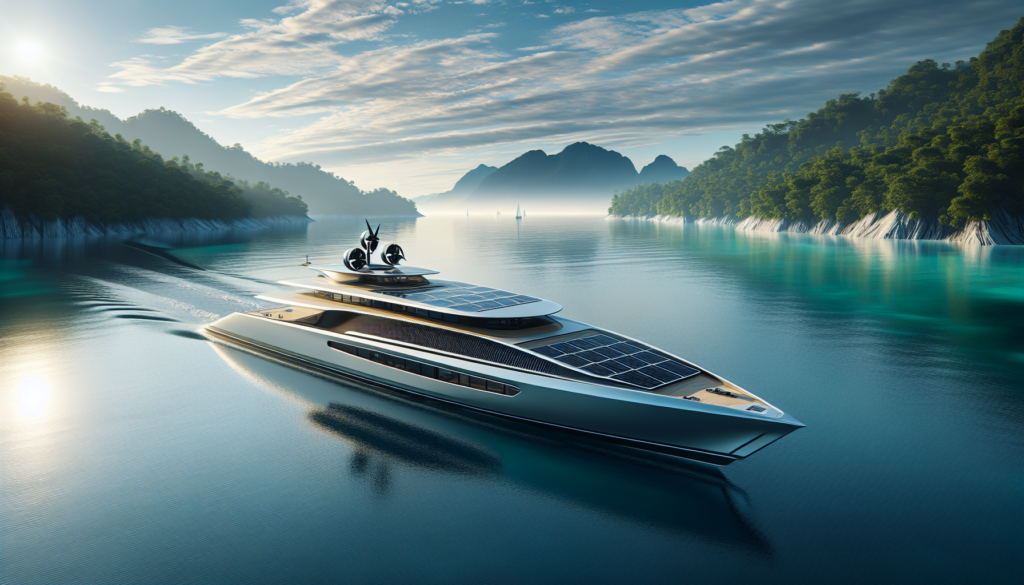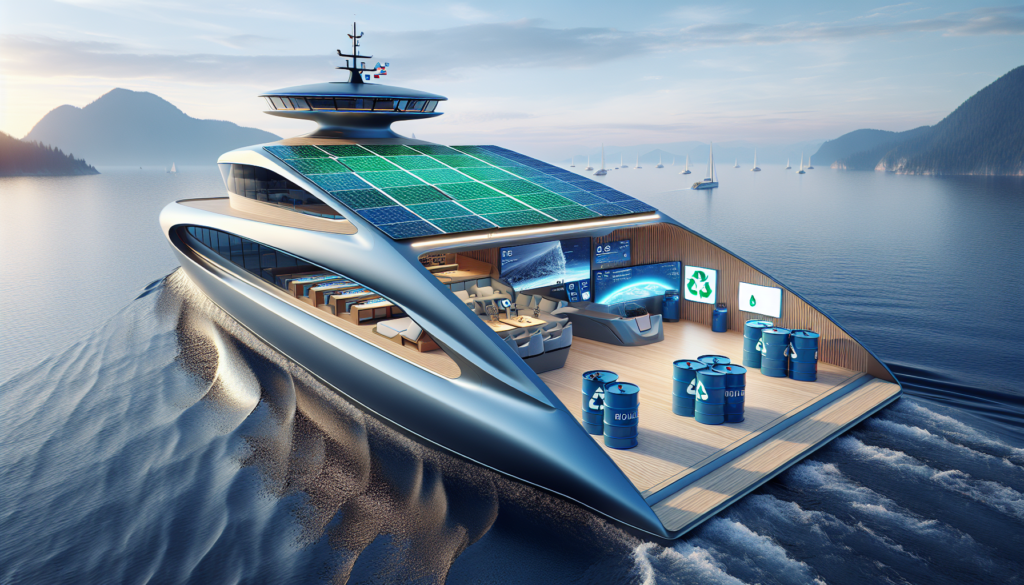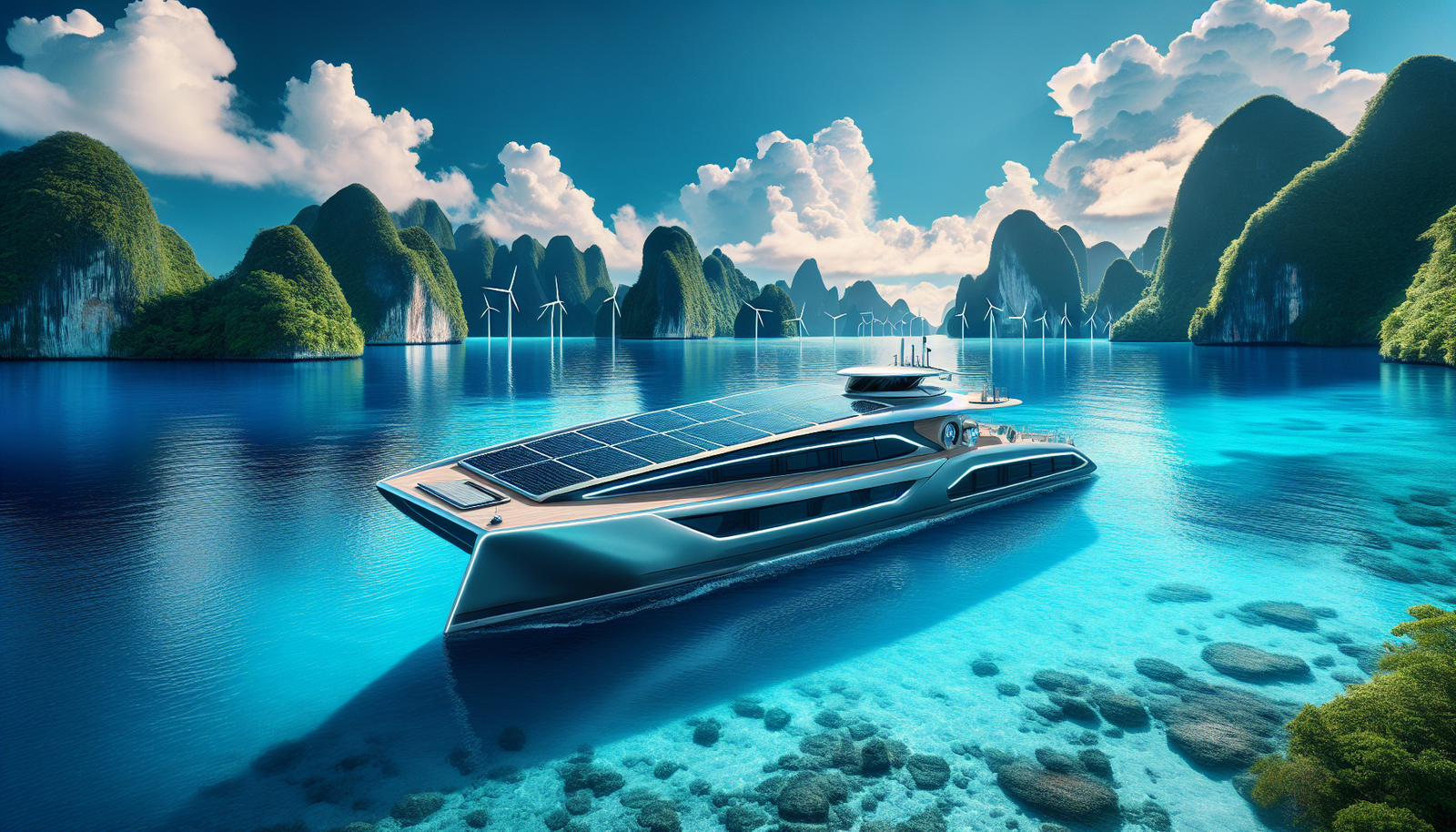Imagine navigating the open seas, feeling the salty sprays of water on your face, as your boat silently glides with not a puff of smoke nor a drop of oil polluting the pristine waters. Sounds intriguing, right? That’s the promise of the future of sustainable boating, a world that enthusiastically blends environmental responsibility with pioneering advancements and innovative designs. Your understanding of boating is set to change dramatically as this field experiences a revolution, marrying technological breakthroughs with sustainability. Let’s uncover the future world of boating, where environmentally friendly practices will balance with the recreational and professional needs of the global boating fraternity. Sustainability in boating won’t just be a choice; it will be the way of life.

Understanding Sustainable Boating
The concept of sustainable boating
You might have heard of sustainable farming or sustainable living, but have you ever considered the concept of sustainable boating? Similar to other areas of sustainability, sustainable boating refers to the practice of boating in a way that minimizes harm to the environment. This can mean anything from constructing boats out of biodegradable materials to using alternative fuel technologies. The idea is to get enjoyment from the ocean without causing damage or contributing to pollution.
The importance of sustainable boating
So why should you care about sustainable boating? Well, water-based recreation is fantastic, but it does leave an environmental footprint. For instance, fuel emissions from motorboats can damage the marine ecosystem. Likewise, inappropriate waste disposal can also pollute the water and cause harm to aquatic life. Sustainable boating offers a path to mitigate these issues. By finding ways to enjoy boating that are more eco-friendly, we can ensure that future generations also get the chance to take pleasure in the ocean’s beauty.
Challenges in sustainable boating
However, transition to sustainable boating is not without challenges. Traditional boating habits can be hard to break, and there’s also a steep learning curve associated with familiarizing oneself with eco-friendly boats and practices. Another obstacle is the cost. In many cases, green technology is more expensive upfront, and some boaters may not see the long-term savings. Plus, there’s the fact that infrastructure for things like charging electric boats is not yet widespread.
Current State of Sustainable Boating
General overview of sustainable boating today
At present, sustainable boating is still somewhat of a niche practice but it’s definitely gaining momentum. More and more boaters are becoming conscious of their environmental impact, and the boating industry is taking note. From boat manufacturers to marina operators, efforts are being made to promote greener boat technology and practices.
Key advancements in sustainable boating
There have already been significant advancements in the realm of sustainable boating. Electric engines, for instance, are becoming more powerful and efficient. Likewise, solar, wind, and wave energy technologies are also being developed for marine applications. There are even boats being constructed entirely of biodegradable materials!
Obstacles and barriers to sustainable boating
Despite these incredible innovations, several hurdles stand in the way of widespread sustainable boating. Besides the high cost of green technology, there’s lack of awareness and misunderstanding about the practicality and performance of eco-friendly boats and equipment. There are also regulatory and logistic challenges relating to things like the placement of charging infrastructure for electric boats.

Technological Innovations Transforming Sustainable Boating
Alternative fuel technologies for boating
When it comes to making boating more sustainable, a key area of focus is alternative fuel technologies. Traditional boat engines run on diesel or gasoline, both of which emit greenhouse gases. Electric engines, fueled by lithium-ion batteries, are a cleaner alternative. Biofuels, such as biodiesel and ethanol, also emit fewer pollutants than conventional fuels.
Solar, wind and wave energy in boating
In addition to alternative fuels, renewable energy sources like solar, wind, and wave energy have potential applications in boating. Solar panels can be installed on the roof of a boat to power everything from navigation lights to refrigerators. Both wind and wave energy technologies are in earlier developmental stages, but they hold great promise for the future.
Digital and IoT technologies in boating
Beyond fuels and power sources, technological innovations are also facilitating the sustainable operation of boats. Digital tools can help boaters navigate more efficiently, conserving fuel in the process. Likewise, IoT devices can monitor energy consumption on boats, providing insights that can support greener behaviors.
Biodegradable Boat Materials Advances
Use of biodegradable materials in boat construction
Building boats out of biodegradable materials is another stride forward in sustainable boating. Traditionally, boats are made from materials like fiberglass and plastic, which are difficult to recycle and harmful to the environment when disposed of. Now, there’s growing interest in constructing boats from organic and biodegradable materials such as flax, cork, and linseed oil-based resins.
Benefits and challenges of using biodegradable materials
The benefits of using these materials are plentiful, not least in terms of reducing a boat’s environmental impact. However, there are challenges too. Biodegradable materials may not be as durable or weather-resistant as conventional materials. There’s also the matter of sourcing these materials sustainably and without causing harm to ecosystems.
Examples of successful cases with biodegradable materials
Despite such challenges, there are successful cases of boats made from biodegradable materials. For instance, some boat manufacturers have developed entirely biodegradable tenders, made from organic flax woven into natural fibers and resin derived from plants. These cases demonstrate that there’s real potential to make boating much more sustainable.

Sustainable Boat Design Strategies
Streamlining and efficiency in boat design
Boat design plays a critical role in sustainability. Streamlined hulls and propellers can minimize drag, reducing the amount of energy needed to propel the boat. Plus, efficient layout of onboard systems can reduce unnecessary energy consumption.
Incorporating green technologies in boat design
It’s not just about the shape of the boat, it’s also about the technology it harbors. Incorporating green technologies is becoming increasingly prevalent in boat design. This may involve installing solar panels, wind generators, and efficient appliances or specifying alternative propulsion systems like electric or hybrid engines.
Case studies of successful sustainable boat designs
There are many noteworthy examples of sustainable boat designs. Some designs incorporate bio-based materials, renewable energy systems, and efficient engines. These encouraging case studies show that sustainable boating is not just a dream, but a feasible reality.
Role of Regulations and Policies
Government regulations that promote sustainable boating
Government roles in sustainable boating are pivotal. Government regulations, such as emission standards for boat engines or rules boarding when and where boats can navigate, can encourage more sustainable practices. Investing in infrastructure to facilitate electric boating is another way governments can support sustainability in this sector.
Corporate policies that support sustainable boating
Companies can also make a big difference. By embracing sustainable practices and setting sustainability goals, boat manufacturers and marina operators can help drive the shift towards sustainable boating. This might involve using renewable energy in their operations, designing more environmentally friendly boats, or offering customers green choices.
Impact of regulations and policies
While enforcement and adherence can be challenging, regulations and policies have substantial potential to promote sustainable boating. They can guide industry practices, impact consumer behavior, and stimulate innovation in the arena of green boating technologies.

Sustainable Boating Education and Awareness
Importance of education in promoting sustainable boating
The role of education in promoting sustainable boating cannot be emphasized enough. It’s essential to make boaters aware of the environmental impacts of their activities and to equip them with the knowledge to make greener choices.
Current efforts in sustainable boating education
Currently, there are several initiatives in place to educate the boating community. These range from workshops on green boating practices to online resources sharing the latest in sustainable boating technology and design.
Opportunities and prospects for boating education
Despite these positive efforts, there’s still plenty of room to grow when it comes to education and awareness. Opportunities exist to more fluidly integrate sustainable boating lessons into boating safety courses, or to engage school-age children and teenagers in learning about marine environment conservation.
Case Studies of Sustainable Boating Models
Exploring successful sustainable boating experiments
There have been several successful experiments in sustainable boating that are worth noting. For instance, some ferry services turned to electric boats to reduce emissions. Similarly, solar-powered research vessels have been used for scientific studies in the open ocean.
Lessons learned from these case studies
These kinds of case studies offer crucial lessons. They demonstrate that sustainable boating is feasible and can produce impressive results. Yet, they also reveal challenges, such as the substantial initial investment required and the need for infrastructure to support sustainable boats.
Impact and potential scaling of these models
The impact of these successful cases is significant in demonstrating the potential of sustainable boating. If these models were scaled up and replicated more widely, the environmental benefits could be immense.
Future Trends in Sustainable Boating
Predicted developments in sustainable boating
There are many exciting developments to look forward to in the world of sustainable boating. The continued advancement and cost-reduction of renewable energy technologies is highly anticipated. The development of new, more sustainable materials for boat construction, as well as further improvements in boat design for efficiency, are also on the horizon.
Potential impact of these future trends
The potential impact of these trends is huge. Over time, a transition to sustainable boating could significantly reduce the marine industry’s greenhouse gas emissions and pollution levels. This could contribute greatly to overall environmental health and the preservation of marine ecosystems.
Challenges and opportunities ahead in sustainable boating
Of course, many challenges lie ahead. Breaking established habits and overcoming initial cost barriers remain big hurdles. But there are also many opportunities. As sustainability becomes a more pressing concern around the world, there’s bound to be increased interest and investment in sustainable boating.
Final Thoughts on the Future of Sustainable Boating
Summarizing the future prospects of sustainable boating
The future of sustainable boating is looking bright. Yes, there are many challenges yet to overcome. But with the rapid evolution of technologies and growing awareness of environmental issues, sustainable boating is set to become increasingly common.
The role of various stakeholders in promoting sustainable boating
So, what’s your role in this? Whether you’re a boater, a boat builder, a policy maker, or simply someone who cares about our oceans, everyone has a part to play. By making informed decisions, supporting sustainable businesses, or implementing green policies, you can help spur the shift towards sustainable boating.
Final reflections on the journey towards sustainable boating
In the end, the journey towards sustainable boating is part of a larger journey towards a more sustainable world. It’s a journey that requires effort, adaptation, and innovation. But it’s also a journey that promises a healthier environment for ourselves and for many generations to come. So let us set sail towards a greener and cleaner boating future.

